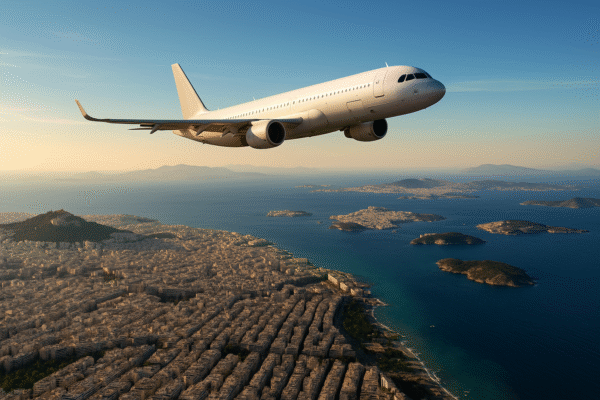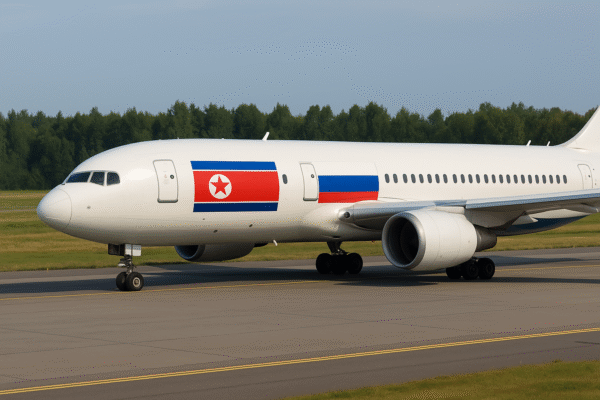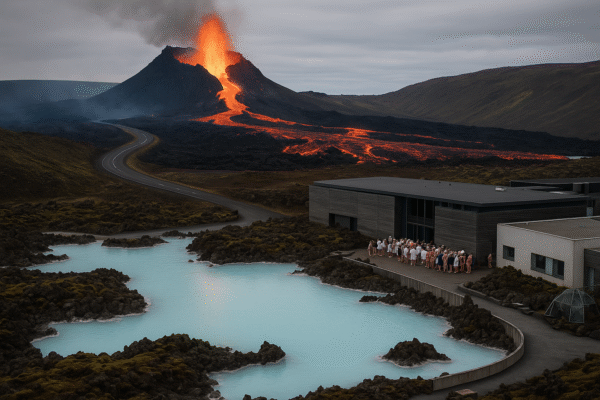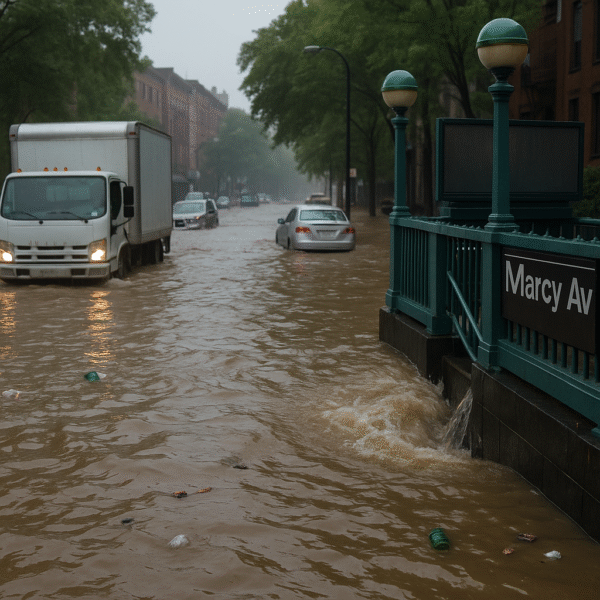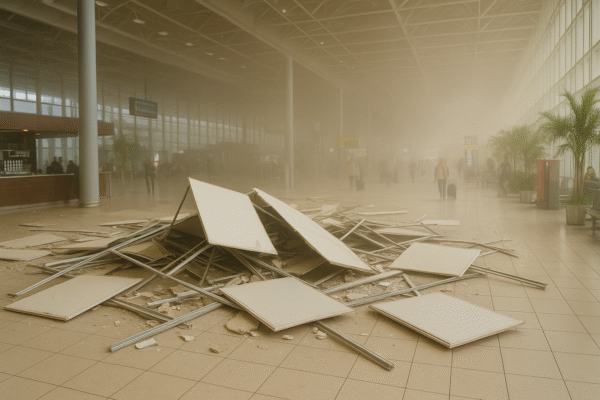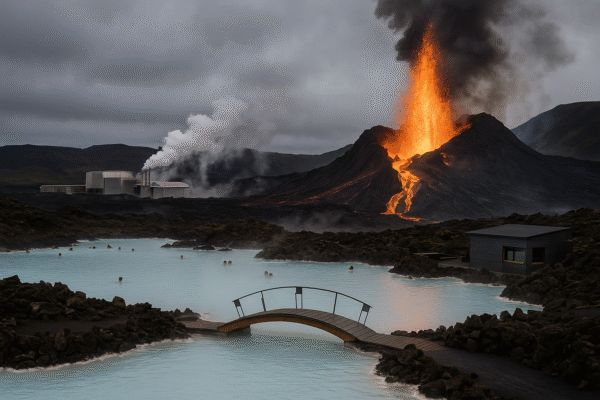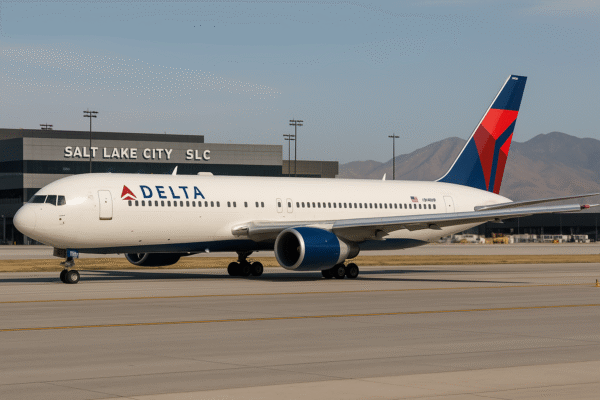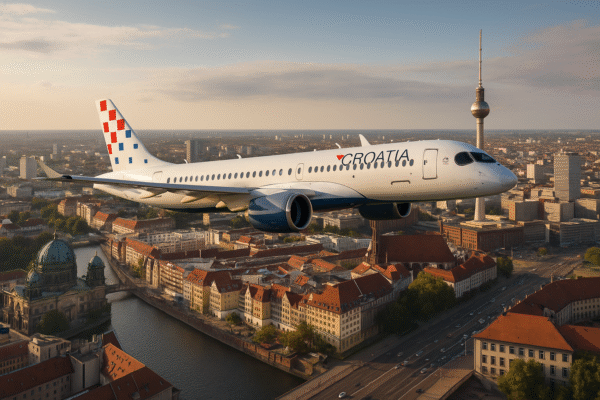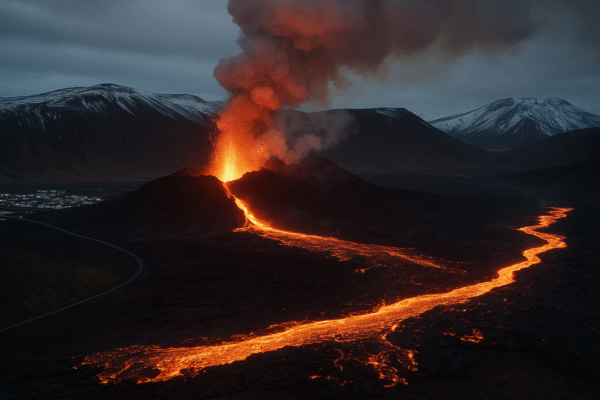Iceland’s Sundhnúkur volcano erupted for the ninth time since December 2023 on Tuesday morning, triggering a rapid evacuation of the world-famous Blue Lagoon geothermal spa and surrounding areas. The eruption, classified as a low-ash fissure event, produced lava flows near the town of Grindavík, leading to road closures and temporary suspension of local tourism operations. Despite the dramatic scenes, air travel across Iceland has remained largely stable.
The Icelandic Meteorological Office confirmed that the eruption occurred along the active volcanic system on the Reykjanes Peninsula. Although the lava does not currently threaten major population centers, it is approaching Grindavíkurvegur, a key transport route connecting parts of southern Iceland. Civil Protection authorities evacuated residents from Grindavík and nearby campsites in the early hours of the morning. Emergency responders executed house-to-house alerts, ensuring the evacuation was completed without injury or incident.
The Blue Lagoon, one of Iceland’s most iconic destinations, suspended all operations and relocated guests. The luxury retreat typically attracts over 500,000 visitors annually and plays a pivotal role in the country’s tourism sector. As of now, all bookings remain on hold pending volcanic assessments.
Despite this, flights to and from Keflavík International Airport (KEF)—the main gateway for international travel—have not experienced widespread disruption. According to ISAVIA, Iceland’s national airport and air navigation services provider, operations continue under careful monitoring.
A flight disruption snapshot as of this morning reveals:
- United Airlines: 2 flight cancellations (50% of scheduled flights).
- Icelandair: 7 minor delays (approximately 5%).
- PLAY Airlines: 1 delay.
- easyJet: 1 delay.
- Air Iceland Connect: 1 delay each at Reykjavík and Egilsstaðir airports.
Reykjavík Domestic Airport and Egilsstaðir Airport on the eastern coast also reported minimal delays. ISAVIA and the Icelandic Civil Protection Department remain on high alert, coordinating flight safety updates through advanced monitoring systems including seismographs, GPS mapping, and aerial drones.
This eruption continues a recent geological trend that began in 2021, marking the Reykjanes Peninsula’s return to volcanic activity after centuries of dormancy. Experts from the Icelandic Meteorological Office forecast that this eruption cycle may persist, as tectonic movement fuels repeated magma intrusions. Since late 2023, the Sundhnúkur volcanic system alone has erupted nine times.
Tour operators across the peninsula have temporarily suspended guided excursions near Grindavík and the Blue Lagoon. However, the rest of the country remains open and unaffected. Reykjavík, the Golden Circle, the Westfjords, and Iceland’s northern and eastern coasts continue to welcome travelers.
The Ministry of Tourism issued a public statement assuring international visitors that “Iceland is open for travel,” while advising caution around the Reykjanes area. Updated advisories are available for route closures and safe travel planning.
The eruption’s impact on aviation remains minimal, thanks in large part to Iceland’s well-tested volcano response protocols. During previous eruptions in the region—including the 2021 Fagradalsfjall event—airspace remained mostly clear due to the non-explosive nature of lava flows. Unlike the 2010 Eyjafjallajökull eruption, which disrupted European air travel due to ash clouds, this fissure eruption produces limited airborne particulates, reducing the risk to jet engines.
“Passengers with travel plans to or from Iceland can proceed as scheduled, though we encourage checking with airlines before departure,” said ISAVIA’s spokesperson. “We are in close coordination with meteorological and civil protection teams to maintain aviation safety.”
Travelers currently in Iceland are advised to stay informed via the SafeTravel.is website, which provides real-time updates on natural hazards, weather, and travel conditions. As of now, no damage to infrastructure has been reported, and energy supplies remain stable despite lava proximity to geothermal plants.
Iceland’s swift and coordinated emergency response once again demonstrated the country’s readiness to handle seismic events with precision and calm. With robust early-warning systems, infrastructure resilience, and public safety as priorities, Iceland has minimized disruption while safeguarding its tourism sector.
As the lava flow continues to be monitored, authorities remain vigilant for changes. But for now, Iceland’s skies remain open, and its natural beauty—outside the active zone—continues to inspire travelers.
For more travel news like this, keep reading Global Travel Wire


